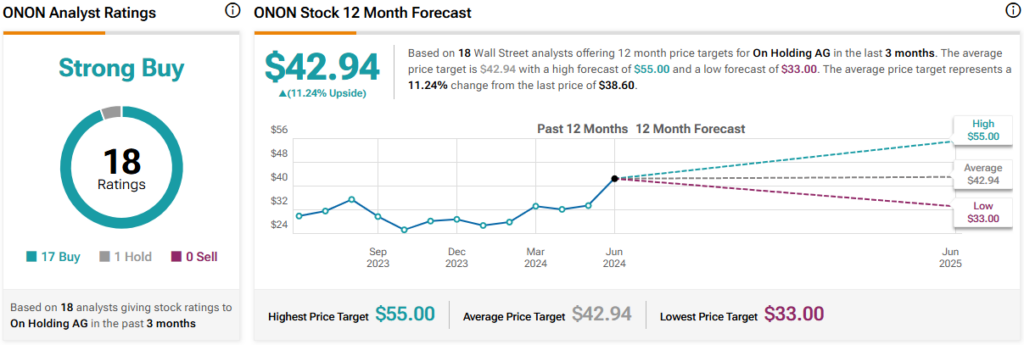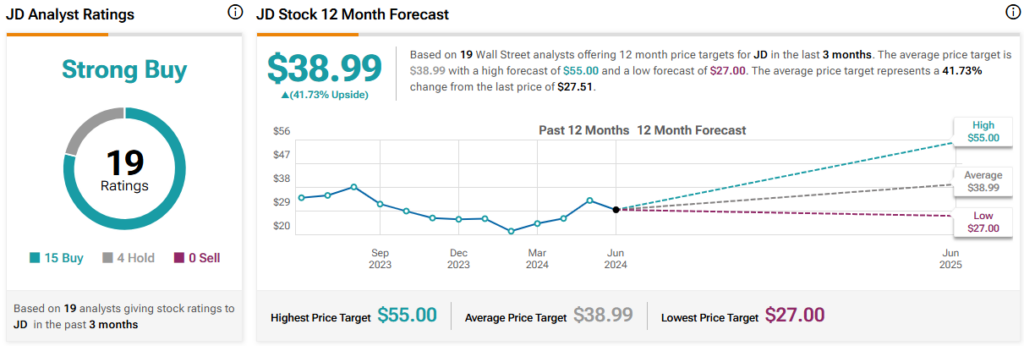The discretionary retail scene may have been a bit rockier in recent quarters, but there have been pockets of brilliance within the space. Undoubtedly, when times get tough, a firm can still stand out (and grow) at the expense of industry rivals. Just because there’s less pie to be had at any given instance doesn’t mean one firm—most notably ELF and ONON—can’t claim more than its fair share of what’s served up.
Claim 70% Off TipRanks Premium
- Unlock hedge fund-level data and powerful investing tools for smarter, sharper decisions
- Stay ahead of the market with the latest news and analysis and maximize your portfolio's potential
Additionally, the retail scene may be worth checking in on ahead of any uptick in consumer spending trends. Market watchers are looking for the Federal Reserve to deliver its first rate cut at some point in the fourth quarter. The first cut, if dealt later this year, may be one of the signs that the Fed has landed that economy softly on the tarmac.
Either way, the anticipation of rate cuts alone may just be enough to do wonders for consumer confidence. Therefore, let’s tune into TipRanks’ Comparison Tool to compare the following Strong-Buy-rated retail stocks (ELF, ONON, and JD).

e.l.f. Beauty (NASDAQ:ELF)
e.l.f. Beauty’s gorgeous game plan has helped it leave the rest of the cosmetics stocks behind. Effective social-media-focused marketing (think its TikTok partnership), a high-value proposition, and a robust omnichannel presence are all contributing factors behind e.l.f. Beauty’s impressive growth, especially among younger Millennial and Gen Z customers.
Though turbulence has made the past year’s stock chart less “pretty” than the longer-term chart, the stock is still near an all-time high, and until young consumers move onto another product, I’m inclined to stay bullish.
Just how much of the resilient sales growth is due to marketing, and how much is because e.l.f. is “disrupting” rivals with lower prices?
I’m not so sure. Either way, e.l.f. is by no means a “cheap” brand, even if its prices are competitive with the industry heavyweights. At the end of the day, influencers can have a big impact on consumer behavior and their view of brands. As a hot new brand on the scene, perhaps e.l.f. Beauty’s best growth days aren’t over yet. For Fiscal Year 2024, e.l.f. broke $1 billion in revenue after a 77% year-over-year sales surge. CEO Tarang Amin says his firm’s growth story is still in the “early innings.” I’d take his word for it.
The only questionable aspect of the stock is that it’s going for nearly 60 times forward price-to-earnings (P/E), miles ahead of the household and personal products industry average of 21.8 times. The bar is high, but if it really is the early innings, that bar is passable, especially if discretionary spending levels rise and e.l.f. continues building brand affinity.
What Is the Price Target for ELF Stock?
ELF stock is a Strong Buy, according to analysts, with 10 Buys and three Holds assigned in the past three months. The average ELF stock price target of $210.00 implies 2.6% upside potential.

On Holdings (NASDAQ:ONON)
Athletic footwear and apparel company On Holdings is another firm that made the leap from mid-cap to large-cap in recent years. Like e.l.f. Beauty, On is the disruptive newcomer on the block. With the Paris Olympics just weeks away, On may get the shot in the arm it needs to get a second wind after the stock’s latest slip off recent highs. In the face of such a timely catalyst, I remain bullish on the stock.
Joseph Civello of Truist Securities views the Olympics as an event that could help On reaccelerate its growth, specifically in the U.S. market. Indeed, the Olympics is a global stage, and with so many people to tune in, On has a chance to really leave a long-lasting impression on a global audience as it shares the podium with some heavyweights in the industry it so seeks to disrupt.
Mr. Civello also views On as “well positioned” to take more market share from Nike (NYSE:NKE). He’s not wrong. On is a mere $12.4 billion company, less than a tenth of Nike’s size, with so much more room to run and a lot more brand affinity to gain as it looks to go for the gold at the Olympics.
The company’s current full-year guidance is calling for 30% growth in net sales. Should On take brand awareness to the next level, I’d argue that growth could easily exceed these projections.
What Is the Price Target for ONON Stock?
ONON stock is a Strong Buy, according to analysts, with 17 Buys and one Hold assigned in the past three months. The average ONON stock price target of $42.94 implies 11.2% upside potential.

JD.com (NASDAQ:JD)
JD is a Chinese e-commerce company caught in a vicious multi-year bearish descent that it’s really struggling to break out of. Now down 74% from its high, JD has less in the way of expectations, but the firm really needs a big catalyst to help it lift up off the canvas in a still-challenged Chinese economic environment. Fortunately, I think JD has the levers to pull to spark a turn in the stock as China looks to stimulate its ailing economy. For now, I’m staying bullish on JD stock.
Notably, JD is in the large language model race with its ChatRhino product, which seems to be leaning more toward the enterprise. ChatRhino seems to be an impressive AI “lever” that can help JD reaccelerate its growth. From supply chain optimization to customer support chatbots, JD is very much looking to AI to better itself amid tough times.
AI aside, JD also has an opportunity to tap into international markets for growth. Europe stands out as a top market to target in the medium term as it mulls retail deals within the region.
What Is the Price Target for JD Stock?
JD stock is a Strong Buy, according to analysts, with 15 Buys and four Holds assigned in the past three months. The average JD stock price target of $38.99 implies 41.7% upside potential.

The Takeaway
I wouldn’t bet against consumers, especially as their behavior shifts rapidly in response to inflation and other headwinds hurting their ability to buy nice-to-haves. Of the following plays, analysts see JD as having the most room to run (a whopping 41.7% in implied upside based on the stock’s average price target) over the next year.
















